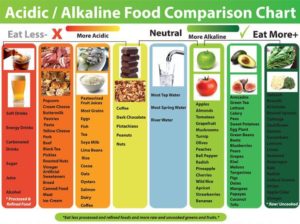
A recent article appeared in iNews 1 that considers whether such debilitating auto-immune conditions can be treated with an alkaline diet; and, if so, what would constitute such a diet. Whilst some of the evidence cited is based on limited case studies or is anecdotal in nature, there appears to be plenty of reasons to consider that there’s something of real value in this dietary approach.
The person on whom the article is focused is a 39-year Manchunian called Hanna Sillitoe 2 who ‘cured’ herself of chronic psoriasis and eczema by experimenting with her own anti-inflammatory diet – “swapping sugar, dairy, wheat, alcohol and caffeine for leafy green vegetables, cold-pressed juices and coconut oil“, and has written a book 3 about her successes.

Blog Contents
Difference between psoriasis and eczema
Psoriasis
- psoriasis is a chronic autoimmune condition
- it results in the overproduction of skin cells
- characterised by thick patches of white scales (the dead cells build up into silvery-white scales)
- skin becomes inflamed and red, causing serious itching
- it’s considered that there’s no cure for psoriasis
- some treatments (see below) aim to put the condition into remission
- psoriasis is not contagious
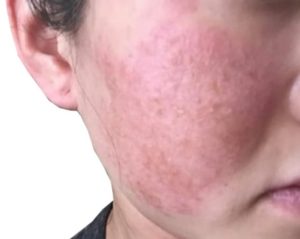
Eczema
- also known as atopic dermatitis
- may also be a long-term condition
- a skin condition caused by a hypersensitivity reaction
- the skin then overreacts to certain triggers (e.g. dyes, fabrics, soaps, animals, and other irritants)
- also caused by emotional stress 4
- very common in infants
- many people outgrow the hypersensitivity by childhood or early adulthood
- skin may appear red, inflamed, peeling, cracked, blistered, or pus-filled
- however, it’s not usually covered with scaly dead skin as with psoriasis
- can appear anywhere on the body (as with psoriasis)
- can cause intense itching
- most eczema can be cleared with topical treatments
- it is not contagious
- some recent research claims that eczema is also an auto-immune disease 5
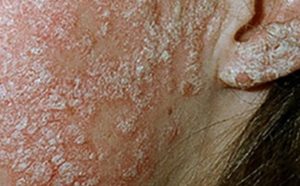
More information (including photographic comparisons) of the differences between psoriasis and eczema are available. 6
Usual treatments for psoriasis
Psoriasis (and eczema, for that matter) tend to run in families, and are considered chronic and largely incurable. Doctors tend to help sufferers to ‘manage’ the condition with:
- topical treatments (such as Vitamin D analogues, vitamin A derivatives, calcineurin inhibitors, salicylic acid, coal tar, and moisturisers)
- light therapy (such as sunlight UV, UVB phototherapy, narrow band UVB phototherapy, Goeckerman therapy, Psoralen plus ultraviolet A (PUVA), and excimer laser)
- oral/injected medications (such as retinoids, methotrexate, cyclosporine, biologics – that is, drugs that alter the immune system, as well as other drugs like Thioguanine, Droxia, and Hydrea)
Most of the above treatments have side effects and their effectiveness in doing anything but managing the condition is questionable. “The goal [of treatment] is to find the most effective way to slow cell turnover with the fewest possible side effects.” 7
Alkaline diet is anti-inflammatory
So if there’s validity in Hanna Sillitoe’s claims to have cured herself and to have helped others to do the same for themselves, what’s the likely mechanism involved?
She claims that the alkaline diet reduces inflammation, which is strongly associated with auto-immune conditions such as these.
Whilst there is some recent research data 8 on the effects of certain dietary changes on psoriasis, (such as a hypocaloric diet 9 in overweight and obese patients with psoriasis, gluten-free diets in patients with gluten sensitivity, vitamin D supplementation, etc) there’s sparse research on the specific effects of an alkaline diet on psoriasis itself.
Potassium and alkaline diets
Having said this, there’s a wealth of research data supporting the contention that a whole food plant-based diet (WFPBD) is anti-inflammatory, and it just happens that a WFPBD is, by its very nature, the most alkaline diet you could eat. This might be due to the high levels of dietary potassium that plant-based diets contain 10 . Indeed, some research 11 directly suggests that psoriasis improves on a plant-based diet because of the increased potassium content – which can combat the negative effects of high cortisol production 12 13 .
In this context, Dr Greger says: 14 “Plant-based diets appear to decrease inflammation via a variety of mechanisms, including boosting our adrenal gland function. Glucocorticoids are circulating steroid hormones produced by our adrenal glands that suppress inflammation and also help our kidneys excrete potassium. When we eat a lot of potassium-rich foods our adrenal glands secrete more glucocorticoids to keep our potassium levels in check, which may have the side effect of decreasing the level of inflammation in the body.”
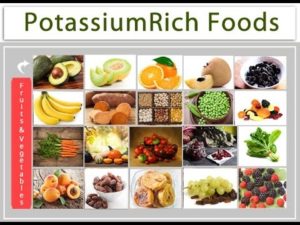
Food and inflammation
It’s recognised that food allergies (for instance, to eggs and peanuts) are linked to eczema 15 16 , and so it’s no great leap to assume that what foods we put or stop putting into our bodies will have an effect on inflammatory conditions. We covered this in some detail when considering inflammatory bowel diseases, such as Crohn’s and ulcerative colitis 17 , and also when we looked at the effects of diet on our microbiome 18 19 20 . The research data in these and other blogs have shown strong evidence that inflammatory diseases are affected by diet. But what research data supports Hanna’s alkaline diet theory?
Research supporting dietary links with psoriasis
One 2017 study 21 found that the following appeared to be the most common triggers reported by psoriasis sufferers:
- sugar
- alcohol
- nightshades
- gluten
The researchers found that 86% of psoriasis sufferers who responded to the questionnaire reported that they had used some form of dietary modification:”The percentage of patients reporting skin improvement was greatest after reducing alcohol (53.8%), gluten (53.4%), nightshades (52.1%), and after adding fish oil/omega-3 (44.6%), vegetables (42.5%), and oral vitamin D (41%). Specific diets with the most patients reporting a favorable skin response were Pagano 22 (72.2%), vegan (70%), and Paleolithic (68.9%). Additionally, 41.8% of psoriasis respondents reported that a motivation for attempting dietary changes was to improve overall health.”
The above is interesting, since the net result of the above-mentioned diets (Pagano, vegan and Palaeolithic) is a reduction or complete avoidance of animal foods (particularly processed meats and dairy) and/or processed/junk foods in general. Just doing this alone will reduce the acidity/increase the alkalinity of the diet, thereby potentially being a primary cause of reduced inflammatory responses.
Shining light on nightshades
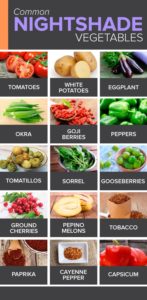
There’s some research 23 data suggesting that potato glycoalkaloids adversely affect intestinal permeability and aggravate IBD.
Dr Michael Greger suggests 24 that if you are one of the 5% or so humans who may have a sensitivity to nightshades, then it may be worth ‘putting it to the test’ and cut them out for a while to see if symptoms improve.
However, it’s important to point out that most nightshade veg are so good for us that it would be an unwise move to simply eliminate them without having strong evidence that they are having a detrimental effect.
There are lots of dietary fashions based on erroneous opinion, so it’s always best to follow the facts rather than the hearsay.
Acid vs Alkaline Foods
The following is a useful general guide to which foods are more or less acidic/alkaline.
Animal foods have been conclusively shown 25 to be more acidic than plant foods (as long as the plant foods don’t have added salt, oil and sugar). Added salt 26 , refined sugars and oils 27 28 29 30 31 have all been shown to be proinflammatory and, thus, really bad for any autoimmune disease.
Some of Hanna’s success stories
The following are before and after photos on the iNews article.



Cold-pressed juices and coconut oil
These were included in Hanna’s diet. I believe that her diet was successful in spite of these two elements. There’s sufficient evidence that neither juicing 32 (rather than eating whole fruits) nor consuming coconut oil 33 are the wisest of dietary choices. Similar, perhaps, to the so-called benefits of red wine in the Mediterranean diet, where the negatives of alcohol are simply out-weighed by the positives of the higher plant-food content in the diet 34 .
Final thoughts
Unusually for the run of the mill media articles covering nutrition, the iNews article actually presents a well-balanced perspective, with research links and no hyperbole. I recommend you read it in full if you have time.
I personally have no doubt that an alkaline diet will reduce inflammation and is thereby likely to help any autoimmune disease. Regardless of which organs are affected, at their core all autoimmune diseases are similar in that they are an immune response caused by systemic inflammation, leading the body to attack itself.
Whilst taking into account any individual’s specific food allergies or sensitivities (be it nightshades, gluten or peanuts, for instance), eating a non-SOS WFPBD is likely to be the best diet to reduce the inflammatory responses in conditions such as eczema and psoriasis.
References
- iNews: The diet that’s been a ‘near cure’ for psoriasis and eczema sufferers. [↩]
- Hanna Sillitoe on Twitter. [↩]
- Radiant – Eat Your Way to Healthy Skin [↩]
- National Eczema Association: Eczema Causes and Triggers. What causes eczema? [↩]
- J Allergy Clin Immunol. 2014. Dupilumab improves the molecular signature in skin of patients with moderate-to-severe atopic dermatitis. Hamilton JD, Suárez-Fariñas M, Dhingra N, Cardinale I, Li X, Kostic A, Ming JE, Radin AR, Krueger JG, Graham N, Yancopoulos GD, Pirozzi G, Guttman-Yassky E. [↩]
- Healthline: Psoriasis vs. Eczema Pictures: Face, Hands, and Legs [↩]
- Mayo Clinic: Psoriasis [↩]
- JAMA Dermatol. 2018 Jun 20. Dietary Recommendations for Adults With Psoriasis or Psoriatic Arthritis From the Medical Board of the National Psoriasis Foundation: A Systematic Review. Ford AR, Siegel M, Bagel J, Cordoro KM, Garg A, Gottlieb A, Green LJ, Gudjonsson JE, Koo J, Lebwohl M, Liao W, Mandelin AM 2nd, Markenson JA, Mehta N, Merola JF, Prussick R, Ryan C16, Schwartzman S, Siegel EL, Van Voorhees AS, Wu JJ, Armstrong AW. [↩]
- Definition of hypocaloric diet: A hypocaloric diet is one in which you eat fewer calories than you burn. Recommended by the National Heart, Lung and Blood Institute, for healthy, long-term weight loss. It can be achieved either by eating fewer calories or by increasing physical activity, which burns more calories. [↩]
- Potassium & Autoimmune Disease. Michael Greger M.D. FACLM December 21st, 2012 Volume 11 [↩]
- Rastmanesh R. Psoriasis and vegetarian diets: a role for cortisol and potassium? Med Hypotheses. 2009 Mar;72(3):368. [↩]
- Cortisol and Potassium link: This concerns electrolyte balance. Cortisol acts as a diuretic, increasing water diuresis, glomerular filtration rate, and renal plasma flow from the kidneys, as well as increasing sodium retention and potassium excretion. It also increases sodium and water absorption and potassium excretion in the intestines. [↩]
- Poliquin group: 10 Cortisol-raising foods to avoid. [↩]
- Plant-Based Diets for Psoriasis. Written By Michael Greger M.D. FACLM on May 30th, 2013 [↩]
- Clin Exp Allergy. 2015 Jan;45(1):255-64. doi: 10.1111/cea.12406. Which infants with eczema are at risk of food allergy? Results from a population-based cohort. Martin PE, Eckert JK, Koplin JJ, Lowe AJ, Gurrin LC, Dharmage SC, Vuillermin P, Tang ML, Ponsonby AL, Matheson M, Hill DJ, Allen KJ. [↩]
- Pediatr Ann. 2015 Jul;44(7):265-7. doi: 10.3928/00904481-20150710-04. Food Allergies and Eczema. Santiago S. [↩]
- IBD / Crohn’s Disease / Ulcerative Colitis & WFPB Diet Part 1 of 5 [↩]
- Two Types of Gut Bacteria: Plant Eaters’ & Meat Eaters’ [↩]
- Oral Microbiota – Meat-Eaters & Plant-Eaters [↩]
- Depression is Linked to Inflammation [↩]
- Dermatol Ther (Heidelb). 2017 Jun; 7(2): 227–242. Dietary Behaviors in Psoriasis: Patient-Reported Outcomes from a U.S. National Survey. Ladan Afifi,corresponding author Melissa J. Danesh, Kristina M. Lee, Kevin Beroukhim, Benjamin Farahnik, Richard S. Ahn, Di Yan, Rasnik K. Singh, Mio Nakamura, John Koo, and Wilson Liao. [↩]
- Dr Pagano diet for Psoriasis [↩]
- Inflamm Bowel Dis. 2002 Sep;8(5):340-6. Potato glycoalkaloids adversely affect intestinal permeability and aggravate inflammatory bowel disease. Patel B, Schutte R, Sporns P, Doyle J, Jewel L, Fedorak RN. [↩]
- Should We Avoid Nightshade Vegetables? Dr Michael Greger [↩]
- Alkaline Diets, Animal Protein, & Calcium Loss. Michael Greger M.D. FACLM October 2nd, 2013 Volume 15 [↩]
- Sodium & Autoimmune Disease: Rubbing Salt in the Wound? Michael Greger M.D. FACLM March 31st, 2017 Volume 35 [↩]
- The effects of diet on inflammation: emphasis on the metabolic syndrome. Giugliano D, Ceriello A, Esposito K. J Am Coll Cardiol. 2006 Aug 15; 48(4):677-85. [↩]
- JPEN J Parenter Enteral Nutr. 2011 Sep;35(5 Suppl). Gut microbiota, intestinal permeability, obesity-induced inflammation, and liver injury. Frazier TH, DiBaise JK, McClain CJ. [↩]
- Am J Clin Nutr. 2011 Aug;94(2):479-85. Low to moderate sugar-sweetened beverage consumption impairs glucose and lipid metabolism and promotes inflammation in healthy young men: a randomized controlled trial. Aeberli I, Gerber PA, Hochuli M, Kohler S, Haile SR, Gouni-Berthold I, Berthold HK, Spinas GA, Berneis K. [↩]
- Eur J Clin Nutr. 2015 Aug;69(8):949-53. doi: 10.1038/ejcn.2015.95. Epub 2015 Jun 17. Consumption of sucrose-sweetened soft drinks increases plasma levels of uric acid in overweight and obese subjects: a 6-month randomised controlled trial. Bruun JM, Maersk M, Belza A, Astrup A, Richelsen B. [↩]
- Nutritionfacts: Oils. [↩]
- Dr John McDougall: To Juice or Not to Juice? What’s A Bottle of Magic Worth? [↩]
- Dr Michael Greger: Coconut Oil [↩]
- The Two Most Active Ingredients of the Mediterranean Diet. Written By Michael Greger M.D. FACLM on January 12th, 2017 [↩]
